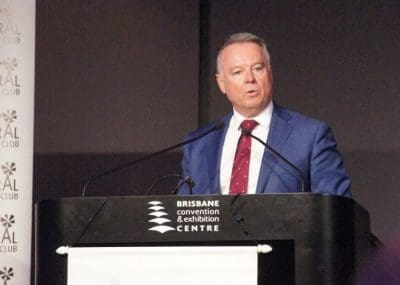Opposition agriculture and resources spokesman Joel Fitzgibbon has quit the frontbench, accusing Labor of talking too much about issues like climate change and not enough about the needs of its traditional base.
 Fitzgibbon told a news conference Labor should wait for Prime Minister Scott Morrison to set a medium-term emissions reduction target and then consider backing it.
Fitzgibbon told a news conference Labor should wait for Prime Minister Scott Morrison to set a medium-term emissions reduction target and then consider backing it.
Although he said he’d planned to step down from the frontbench 18 months after the election – and had told Labor leader Anthony Albanese some months ago he would do so before Christmas – Fitzgibbon’s timing couldn’t be worse for his leader.
It undermines Albanese’s push to use Democratic presidential candidate Joe Biden’s victory in the US election to ramp up Labor’s attack on the government over climate policy.
Fitzgibbon’s exit from the shadow ministry follows his increasingly outspoken public campaign – which has infuriated many colleagues and caused serious friction with climate spokesman Mark Butler – to push Labor’s climate and energy policy towards the centre.
The tensions between Fitzgibbon and Butler forced the shadow cabinet recently to settle an agreed set of words on the party’s position on gas, to contain public differences on that issue.
At the weekend, Fitzgibbon, who is from the NSW right, sent a thinly veiled warning to his party, saying “this idea that a Biden victory is a vindication of all those who want to set Australia on a path to slower economic growth and large job losses is delusional”.
Fitzgibbon’s behaviour came under fire at a Monday night meeting of left caucus members.
He will be replaced on the frontbench and in the agriculture and resources post by the NSW right’s Ed Husic, who was squeezed out of a frontbench position after the election to accommodate Kristina Keneally.
Fitzgibbon affirmed his support for Albanese’s leadership, saying he would lead to the election. But with some in caucus restless at Albanese’s failure to cut through, there is always a risk of leadership destabilisation.
At Tuesday’s caucus, Albanese moved a motion recognising Fitzgibbon’s service.
Fitzgibbon said that since the election “I’ve been trying to put labour back into the Labor Party. Trying to take the Labor party back to its traditional roots, back to the Labor party I knew when I first became a member 36 years ago.”
“I think the Labor party has been spending too much time in recent years talking about issues like climate change – which is a very important issue – and not enough time talking about the needs of our traditional base.”
He said he had told the caucus meeting Labor should allow candidates and members “to express the aspirations of their local communities”. It couldn’t expect a candidate in an inner Melbourne seat to be saying the same thing as one in central Queensland.
Asked what Labor should do on climate policy, Fitzgibbon said its policy should be “meaningful”.
“I’m a serious believer that the climate is changing and humankind is making a contribution. And government should act.”
But “we need to stop so often being government-in-exile,” he said.
He said Morrison was committing a lot of money on the technology side of the climate change issue, rather than addressing it with a constraint on carbon.
“If Scott Morrison is serious about his actions, spending taxpayers’ money, then who knows where we’ll be on the carbon output equation or ledger in possibly two years’ time?” he said.
“I think we should let Scott Morrison make his investment, allow him to encourage others to invest. … Let him establish his next medium-term target.” Once he did so “the Labor Party should think about backing it.”
Fitzgibbon said he supported 2050 net zero emissions “as an ambition”.
“But the path to 2050 will not be linear. As technology kicks in, the effort will reduce. See, you don’t have to be halfway there at the halfway point.
“So, let Scott Morrison govern it. Let’s hold him to account. Let’s see what he sets. And let’s take some time to see whether he’s on track to meeting the commitment he makes.”
Fitzgibbon said Labor could not form government without winning at least two central and north Queensland electorates, and a couple around the rim of Perth, where there were a lot of fly-in-fly-out workers.
He said Labor had had at least six climate change/energy policies in the last 14 years.
“Only one of them was ever adopted by a Labor government. And, of course, that policy, having been legislated, was repealed by Tony Abbott.
“So, the conclusion you can draw from that is that after 14 years of trying, the Labor party has made not one contribution to the reduction of greenhouse gas emissions in this country,” he said.
“So, if you want to act on climate change, the first step is to become the government.
“And to become the government, you need to have a climate change and energy policy that can be embraced by a majority of the Australian people. That is something we have failed to do for the last seven or eight years.”![]()
Michelle Grattan, Professorial Fellow, University of Canberra
This article is republished from The Conversation under a Creative Commons license. Read the original article.

It’s great to see a politician of either side with conviction to their cause- Joel understood our industry and was a great advocate on his side of the house for rural and agriculture. We should be glad he hasn’t gone too far away
Joel Fitzgibbon has long been a friend of agriculture and his centrist, practical voice will be sorely missed.